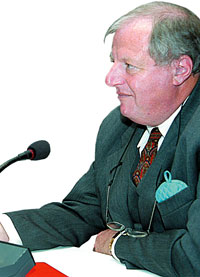United Nations Resident Coordinator in Nepal, Mathew Kahane spoke to Nepali Times just after King Gyanendra's proclamation restoring parliament. Excerpts:
 Is there a sense of optimism that political resolution is on its way?
Is there a sense of optimism that political resolution is on its way?
Nepal now has an opportunity to move forward because the political framework for this has been established. Of course, great challenges lie ahead. The new government will need to work out quickly how to both deliver services and political solutions. But, Nepal now has the best basis on which to move forward and to address some of the fundamental development challenges facing this nation, which is still among the poorest in the world.
What is your message for the king, seven-party alliance as well as the Maoist leaders on this positive development?
Many details need to be ironed out but fundamentally this new development presents a real opportunity to address some of the political issues holding Nepal back. The Maoists have the opportunity to renounce violence and to find a place in the normal political process.
What are some of the other issues?
The parties have talked about restructuring state institutions in a way that there would be stronger checks and balances between, for example, the executive and other arms of the government, the army and judiciary. The UN could be a good source of that advice.
What role will the UN/EU now play in helping Nepal to move the peace process ahead?
Many areas that the new government will need to address are ones that the UN has extensive experience in. The party leaders know that we stand ready to help, in the area of monitoring elections for example. If the people of Nepal and the government seek the help of the UN, we are more than happy to assist in any way that we can.
What about the Maoists in particular?
Much more discussion is needed about the Maoists giving up armed struggle. Those are the kind of discussions where some sort of third-party assistance is useful and may be necessary. For example, to ask probing questions like, 'when you say yellow, do you mean yellow or do you mean orange-yellow'? The Maoists have also previously said that they would agree to supervision of their arms in general but this is a process that needs to start as soon as possible and one where the devil is in the details.
What other challenges do you foresee?
In the long term, Nepal faces great development challenges. Inequality and exclusion, which are the root causes of the insurgency and in many ways have enabled it to spread, need to be addressed. Disadvantaged groups, women and others who have been traditionally excluded now need to be assisted in participating fully in society through education, health and other opportunities.
All these activities will require resources. Do you think donors will be willing to contribute?
A number of donors have assured us that resources would be forthcoming as they've been forthcoming for the UN human rights office.


